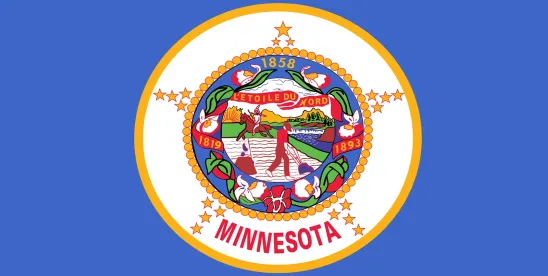After controlling Minnesota’s House, Senate, and governorship since 2023, the Minnesota Democratic–Farmer–Labor (DFL) Party’s legislative and gubernatorial “trifecta” at the state capitol is no more. The 2025 regular session of the Minnesota Legislature began with Democrats and Republicans tied at sixty-seven members each in the House and a slim DFL majority in the Senate, meaning no single party can push through its agenda alone.
With every vote carrying significant weight in the session, legislators must reach across the aisle to achieve the majority vote required to pass bills. The question is, who will compromise, and what will it take to break the tie?
Quick Hits
- The Minnesota Legislature’s party divide creates uncertainty for employers, with amendments to key labor laws like Paid Family and Medical Leave and Earned Sick and Safe Time potentially facing delays or requiring bipartisan compromise.
- Proposed amendments to Minnesota’s Earned Sick and Safe Time Law include delaying penalties for violations before January 1, 2026, making Earned Sick and Safe Time permissive, and changes to leave notice requirements and documentation for extended leave, but none have advanced past initial stages.
- Various bills aim to modify or delay the Paid Family and Medical Leave Law, with some proposing exemptions for small employers and others seeking to repeal the law or delay its implementation until 2027.
This divide in the Minnesota Legislature means uncertainty for Minnesota employers. Critical issues, such as Minnesota’s Paid Family and Medical Leave and Earned Sick and Safe Time (ESST) laws, may either face delays or require bipartisan compromise to advance. Employers should stay alert until the end of the legislative session on May 19, 2025, as the legislature negotiates the future of Minnesota’s labor and employment laws.
This article previews key proposed bills that would impact employers if enacted. While it is too early to predict which bills will reach the governor’s desk, the nature of the proposed legislation offers insight into the extent of the legislative divide and the effort required by the legislature to pass any bills.
Minnesota Earned Sick and Safe Time
A handful of proposed bills would amend Minnesota’s ESST law, but none have advanced past their introduction and first reading. These bills sit in the Minnesota House of Representatives’ Workforce, Labor, and Economic Development Finance and Policy Committee and the Minnesota Senate’s Labor Committee, respectively.
House File (HF) 2025 / Senate File (SF) 2300 would create the most significant changes among the proposed bills. These companion bills, among other amendments, would:
- exempt employers with fewer than fifteen employees from ESST requirements;
- allow prorating ESST hours based on full-time or part-time employee status;
- change employee notice for unforeseeable leave from “as soon as practicable” to “as reasonably required by the employer”;
- allow employers to ask for documentation if ESST use exceeds two days;
- remove certain paid time off (PTO) requirements; and
- let employers ask employees to find replacements unless the leave is unforeseeable and permit employees to find replacements on their own.
Other proposed bills would exclude farm employees working for farms with five or fewer employees (HF 1057 / SF 310), Department of Transportation workers (HF 1905), and inmates of correctional facilities (SF 947) from certain requirements; exclude employees appointed to serve on boards or commissions from certain definitions (HF 758 / SF 494); and give employers the option to provide certain benefits (HF 1542 / SF 2572). HF 1325 / SF 2605 would prohibit penalties for violations before January 1, 2026, and provide various exemptions and proration options for small employers.
Paid Family and Medical Leave (Paid Leave)
Various proposed bills aim to change the Paid Leave Law, including potentially delaying its implementation for another year or repealing it altogether. Notably, HF 0011 / SF 2529 would delay the law’s implementation by one year, meaning employees would not receive benefits until January 1, 2027. Once it was sent to the House floor for debate and vote, the House laid HF0011 on the table. No further action will be taken until the House reconsiders the bill.
Other related bills to watch:
- HF 1241 / SF 1771 and HF 1263 / SF 2277 would repeal the Paid Leave Law and return unspent money to the general fund.
- HF 0260 / SF 1793 would exempt employers with twenty or fewer employees until January 1, 2028.
- HF 2113 would exempt employers with fifty or fewer employees.
- HF 2024 would exempt certain small employers; change the definition of a seasonal employee; allow private plans to provide shorter durations of leave and benefits under certain circumstances; and postpone benefits until January 1, 2027.
- HF 1523 / SF 1849 would exempt certain agricultural workers.
- HF 2269 would delay employer penalties for failure to notify employees of paid leave benefits until January 1, 2027.
- HF 1976 / SF 2466 would exempt collective bargaining agreement employees from the definition of “covered employment” under certain conditions; remove individuals with personal relationships with employees from the definition of “Family Member”; change the definition of “small employer” to fifty or fewer employees; and require small employers to pay a 50 percent rate among other amendments.
Nondiscrimination
The legislature introduced numerous bills targeting nondiscrimination laws, which are summarized here.
- HF 1672 / SF 2371 would expand nondiscrimination provisions to include medical cannabis patients.
- HF 2182 / SF 200 would allow employers to justify adverse impact of discriminatory practices if related to the job or business purpose.
- HF 0481 / SF 1529 would prohibit employment discrimination based on refusal of medical intervention.
- HF 0282 / SF 407 would add political affiliation as a protected category under the Minnesota Human Rights Act. Similarly, SF 863 would prohibit employers from engaging in economic reprisals based on political contributions or activity.
- HF 1427 / SF 1111 would require transportation network companies to make vehicles wheelchair-accessible and adopt nondiscrimination policies.
Independent Contractors
The legislature has taken up several bills related to independent contractors. Below is a summary of the key bills currently under consideration:
- HF 1316 / SF 2306 would require employers to report newly hired independent contractors to the commissioner of children, youth, and families for child support purposes.
- SF 2153 would expand “prohibited practices” to include “if an employer has a formal job classification and compensation plan, place an employee in a job classification or job category or provide a job title that misrepresents the employee’s experience or actual job duties and responsibilities.”
- HF 2145 / SF 2361 woulddouble the potential penalty for employers that intentionally misrepresent an employee as an independent contractor in the unemployment insurance or paid family and medical leave programs.
Job Postings, Employment Agreements, and Unions
The legislature also introduced bills that would affect job posting requirements, employment agreements, and unions. Namely:
Job Postings
- HF 1484 / SF 2235 would require job postings to disclose whether employee health plan options comply with cost-sharing limits.
Employment Agreements
- HF 2567 / SF 2533 would prohibit stay-or-pay provisions as a condition of employment.
- HF 1768 would provide more circumstances under which a covenant not to compete is valid and enforceable.
Unions
- HF0107 / SF1532 would allow strikers who stop working due to a labor dispute to be eligible for unemployment benefits.
- SF 1148 would allow applicants to be eligible for unemployment benefits if the employer hires a replacement worker for their position.
- HF 2240 / SF 3050 would allow private employees to allocate their union dues to a local, state, or national organization of their choice.




 />i
/>i


